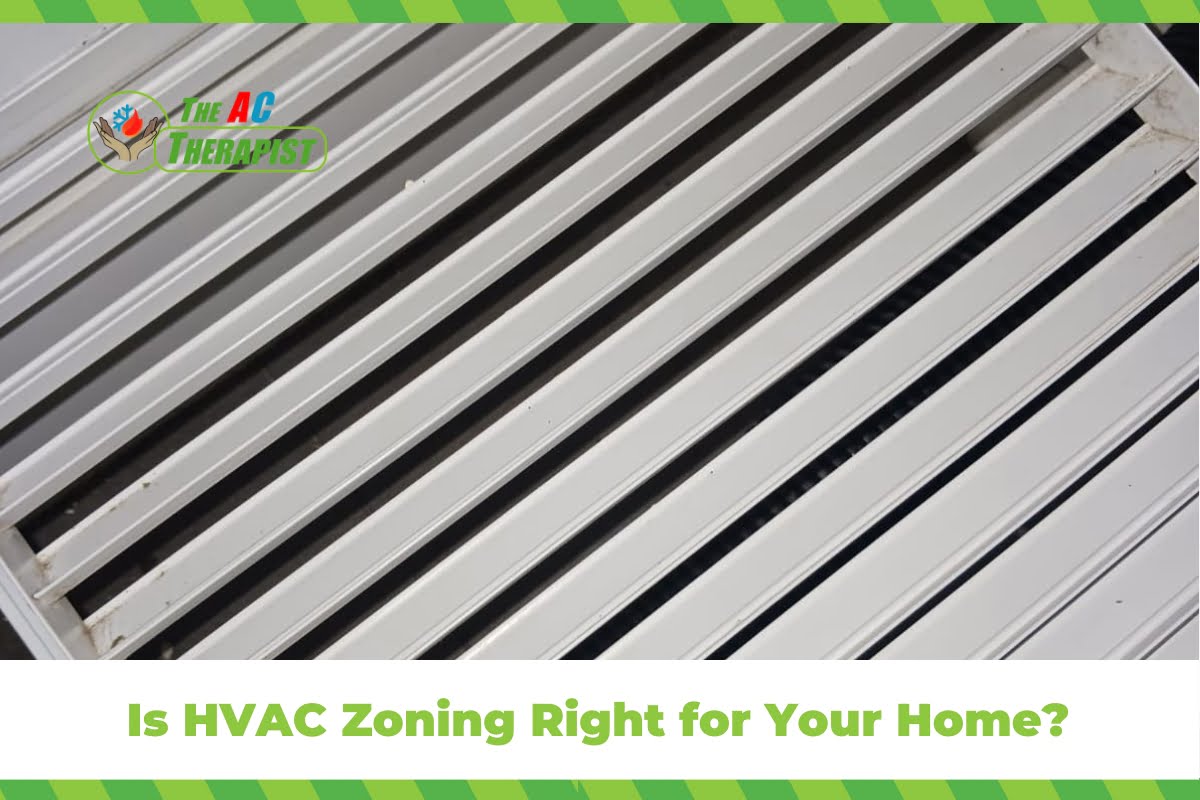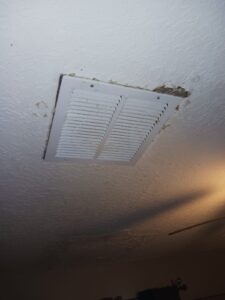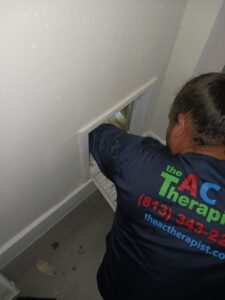Is HVAC Zoning Right for Your Home?
Hello there, I’m The AC Therapist, your go-to expert for all things HVAC-related. Today, we’re diving into a topic that can significantly impact your home’s comfort and energy efficiency: HVAC zoning systems. In this comprehensive guide, we’ll explore what zoning systems are, how they work, and why they might be the perfect solution for your home.
What Is a Zoning System?
A zoning system, in the context of HVAC (Heating, Ventilation, and Air Conditioning), is a method used to divide a building or living space into distinct and separate climate control zones. Each zone has its thermostat and control, allowing for individualized temperature and airflow adjustments. HVAC Zoning systems are designed to provide customized comfort and energy efficiency by directing heating or cooling only to the areas that need it, rather than conditioning the entire space.
How Do Zoning Systems Work?
Zoning systems in HVAC (Heating, Ventilation, and Air Conditioning) work by dividing a building or living space into distinct climate control zones and then regulating the temperature and airflow in each zone independently. Here’s how HVAC zoning systems work:
- Zone Creation: HVAC Zoning systems begin by identifying specific areas within a building that require individualized climate control. These areas can vary based on the layout and heating/cooling needs of the space. Common zones include bedrooms, living rooms, kitchens, and offices.
- Thermostat Control: Each zone is equipped with its thermostat, which allows occupants to set their desired temperature for that area. The thermostats serve as the control centers for their respective zones.
- Dampers: Dampers are key components of zoning systems. These are installed within the ductwork and are responsible for controlling the flow of conditioned air to each zone. Dampers can open or close based on signals from the zone’s thermostat.
- Zoning Control Panel: A central HVAC zoning control panel or system controller coordinates the operation of the individual thermostats and dampers. It receives input from the thermostats and directs the dampers to open or close accordingly to achieve the desired temperature in each zone.
- Zone-Specific Operation: When someone adjusts the thermostat in a particular zone, the corresponding damper(s) adjust to allow more or less airflow into that area. For example, if a bedroom’s thermostat is set to a lower temperature, the damper in the bedroom’s ductwork will open wider to provide more cool air to that zone.
- Continuous Monitoring: HVAC Zoning systems continuously monitor the temperature in each zone and make real-time adjustments to maintain the set temperatures. This prevents overheating or overcooling in any area and ensures consistent comfort throughout the building.
- Energy Efficiency: HVAC Zoning systems contribute to energy efficiency by directing conditioned air only to zones that need it. This minimizes energy waste by avoiding the heating or cooling of unoccupied or less frequently used areas.
- Smart Zoning: Some modern HVAC zoning systems incorporate smart technology, allowing users to control and monitor their zones remotely through smartphone apps or web interfaces. This adds convenience and enables more advanced scheduling and automation options.

Benefits of Zoning Systems
Zoning systems in HVAC (Heating, Ventilation, and Air Conditioning) offer a range of benefits that can significantly enhance comfort, energy efficiency, and overall indoor living or working conditions. Here are some key advantages of using HVAC zoning systems:
- Customized Comfort: HVAC Zoning systems allow individuals to set different temperature preferences for specific areas or zones within a building. This customization ensures that each space is heated or cooled to the occupants’ comfort levels, eliminating temperature imbalances and ensuring satisfaction for everyone in the building.
- Energy Efficiency: One of the most significant benefits of zoning systems is improved energy efficiency. By directing heating or cooling only to the zones that need it at any given time, zoning minimizes energy waste. This can lead to substantial cost savings on utility bills and a reduced carbon footprint.
- Reduced Utility Costs: As zoning systems optimize the use of your HVAC system, they can result in lower heating and cooling expenses. By avoiding the conditioning of unoccupied or seldom-used areas, you’ll see reduced energy bills over time.
- Enhanced Control: HVAC Zoning systems provide precise control over each zone’s temperature, allowing occupants to tailor their environment to their liking. This can be especially beneficial in homes with multiple family members who have varying temperature preferences.
- Improved Comfort: HVAC Zoning helps eliminate “hot” or “cold” spots within a building, ensuring a more consistent and comfortable indoor environment. You won’t have to tolerate areas that are too warm or too cool.
- Better Indoor Air Quality: HVAC Zoning can improve indoor air quality by managing airflow and filtration more effectively. It helps distribute fresh air more evenly throughout the building, reducing the potential for allergens and pollutants to accumulate in specific areas.
- Extended HVAC System Life: Zoning systems can help prolong the lifespan of your HVAC equipment. By reducing the overall workload on the system and preventing it from running constantly, you can reduce wear and tear and potentially extend the time between repairs and replacements.
- Increased Property Value: Homes or buildings with HVAC zoning systems are often seen as more desirable and energy-efficient. This can enhance the property’s value and marketability, making it a wise investment for homeowners and property managers.
- Flexible Applications: HVAC Zoning systems are versatile and can be applied in various settings, including residential homes, multi-story buildings, and light commercial spaces. They provide tailored solutions to meet specific needs.
- Smart Technology Integration: Many HVAC zoning systems today incorporate smart technology, allowing for remote control and automation through smartphones or computers. This adds convenience and allows for more advanced scheduling and energy-saving features.
Types of Zoning Systems
Zoning systems in HVAC (Heating, Ventilation, and Air Conditioning) come in various types, each designed to meet specific needs and requirements. Here are the primary types of zoning systems:
Single-Zone Zoning: Single-zone zoning is a straightforward approach to dividing a building into distinct climate control areas. In this setup, the building typically has only two zones: one for the primary living space and another for the bedrooms. Each zone has its thermostat, allowing occupants to set different temperature preferences for these two general areas. While it offers some level of customization, it is most suitable for smaller homes, apartments, or spaces where individual room temperature control is not a top priority. This type of zoning system is straightforward and cost-effective but lacks the fine-grained control found in more advanced systems.
Multi-Zone Zoning: Multi-zone zoning takes customization to the next level by dividing a building into numerous zones, each equipped with its thermostat and control. This setup allows occupants to have precise control over the temperature in individual rooms or areas, providing comfort tailored to their preferences. It is especially ideal for larger homes or buildings with multiple floors, where different zones may have varying heating and cooling needs. Multi-zone systems offer the flexibility to create distinct climate zones, reducing energy waste by conditioning only the areas in use.
Smart Zoning Systems: In today’s technology-driven world, smart zoning systems have gained popularity. These systems integrate advanced technology, such as Wi-Fi-enabled thermostats and smartphone apps, allowing users to control and monitor their zones remotely. Smart zoning systems may include features like occupancy sensing, learning algorithms, and integration with other smart home devices. This level of automation and convenience appeals to those seeking not only precise climate control but also energy-saving capabilities and the ability to manage their HVAC system from anywhere.
Ducted Zoning: Ducted zoning systems utilize motorized dampers within the ductwork to regulate airflow to different zones. These dampers open or close based on thermostat settings, directing conditioned air to the zones that require heating or cooling. This type of zoning is commonly found in homes with centralized HVAC systems that rely on ductwork for distributing air. Ducted zoning provides an effective way to achieve zoning capabilities in buildings with existing ducted heating and cooling infrastructure.
Ductless Mini-Split Zoning: Ductless mini-split systems inherently offer zoning capabilities. Each indoor air handling unit, known as a “head,” can be independently controlled, allowing precise temperature adjustments for individual rooms or zones. Ductless mini-splits are suitable for spaces without ductwork or for those looking to add zoning capabilities to specific areas. They offer versatility and energy efficiency while providing comfort tailored to each zone’s requirements.
Hydronic Zoning: Hydronic zoning systems employ hot water or steam to heat different zones within a building. These systems often involve separate radiators, baseboard heaters, or underfloor heating systems for each zone. They are particularly popular for heating applications in residential homes and commercial spaces, especially in colder climates. Hydronic zoning offers efficient and even heating, with the ability to customize temperature settings for various areas of the building.
Constant-Volume Zoning: Constant-volume zoning systems regulate the airflow by adjusting the volume of air supplied to different zones. These systems are typically found in larger commercial buildings and may not be as common in residential settings. They are well-suited for buildings with complex HVAC needs, where maintaining a consistent airflow rate is crucial for maintaining indoor air quality and occupant comfort.

Is Zoning Right for Your Home? 5 Expert Tips from The AC Therapist
Zoning systems in HVAC (Heating, Ventilation, and Air Conditioning) can offer numerous benefits, but determining whether they are the right choice for your home involves careful consideration. As The AC Therapist, your trusted HVAC expert, I’m here to provide you with five expert tips to help you make an informed decision.
1. Assess Your Home’s Layout and Needs: The suitability of zoning systems often depends on the layout and size of your home. Take a close look at your home’s floor plan. Do you have multiple floors, distinct living spaces, or areas with varying heating and cooling requirements? HVAC Zoning is particularly beneficial in larger homes with different zones that have unique comfort needs. Identifying these needs is the first step in deciding if zoning is right for you.
2. Evaluate Your Comfort Preferences: Consider the comfort preferences of your household members. Are there areas in your home that consistently feel too hot or too cold? HVAC Zoning allows you to address these comfort issues by tailoring the temperature in each zone to meet individual preferences. If you have family members with differing temperature requirements, zoning can provide a harmonious solution.
3. Analyze Energy Efficiency Goals: Energy efficiency is a significant advantage of zoning systems. They help reduce energy waste by directing heating or cooling only to the zones in use. If you’re looking to lower your utility bills and reduce your carbon footprint, HVAC zoning may align with your energy efficiency goals.
4. Consult with HVAC Professionals: It’s essential to consult with HVAC professionals like The AC Therapist. We can assess your home’s specific needs, recommend the right zoning system, and ensure a proper installation. Our expertise will help you make an informed decision and avoid potential pitfalls associated with DIY zoning.
5. Consider Smart Zoning Options: Smart HVAC zoning systems, equipped with advanced technology and remote control features, offer added convenience and energy-saving benefits. If you’re tech-savvy and desire the ability to manage your HVAC system from your smartphone or computer, explore smart zoning solutions.
HVAC Zoning Maintenance
Maintenance is a crucial aspect of keeping your HVAC (Heating, Ventilation, and Air Conditioning) system, including zoning systems, running efficiently and reliably. Regular maintenance helps prevent breakdowns, ensures optimal performance, and extends the lifespan of your equipment. Here are some essential maintenance tasks for HVAC zoning systems:
- Change Air Filters: Regularly inspect and replace air filters in your HVAC system, including any zone-specific filters if applicable. Clogged filters restrict airflow, reduce efficiency, and can lead to system strain. The frequency of replacement depends on the type of filter and usage, but it’s typically recommended every 1 to 3 months.
- Check Thermostat Functionality: Verify that all thermostats are functioning correctly in each zone. Test the temperature adjustments, modes (heating, cooling, fan), and any programmed schedules. Replace batteries in non-wired thermostats as needed.
- Inspect Dampers: Examine the motorized dampers within the ductwork to ensure they are opening and closing correctly in response to thermostat signals. Calibration may be necessary to maintain precise temperature control in each zone.
- Clean ductwork: Periodically schedule professional duct cleaning to remove dust, debris, and allergens from the ducts. Clean ducts allow for better airflow, maintain indoor air quality, and prevent blockages that can strain the HVAC system.
- Test Zone Balancing: Check the overall balance of temperature across the various zones. Adjust damper settings as needed to ensure even heating or cooling throughout your home or building. Address any hot or cold spots to maintain comfort.
- Lubricate Moving Parts: If your zoning system uses motorized dampers, they may have moving parts that require lubrication. Consult your system’s maintenance manual or hire a professional to perform this task.
- Inspect Wiring and Electrical Components: Check for loose or damaged wires and connections in your HVAC zoning system. Faulty wiring can lead to malfunctions or system failures. Ensure that all electrical components are secure and in good condition.
- Clean and Calibrate Sensors: If your HVAC zoning system includes occupancy sensors or temperature sensors, clean and calibrate them as recommended by the manufacturer to maintain their accuracy.
- Software and Firmware Updates: If you have a smart HVAC zoning system, regularly check for software and firmware updates for the control panel and thermostats. Keeping your system’s software up to date ensures it functions correctly and may provide additional features or improvements.
- Schedule Professional Maintenance: Consider scheduling annual or bi-annual maintenance visits from HVAC professionals like The AC Therapist. These experts can perform a thorough inspection, cleaning, and calibration of your zoning system to keep it operating at peak efficiency.
Remember that proper maintenance not only ensures the performance and efficiency of your HVAC zoning system but also helps maintain indoor air quality and can extend the life of your equipment. Regular checks and timely repairs can prevent more significant issues down the road, saving you both money and inconvenience.
Zoning Systems: Where Comfort Meets Efficiency – Trust The AC Therapist for Expert Guidance
In conclusion, the world of HVAC (Heating, Ventilation, and Air Conditioning) has evolved significantly, and zoning systems have emerged as a game-changer for customized comfort and energy efficiency. As we’ve explored in this blog, zoning systems, whether single-zone or multi-zone, offer a plethora of benefits for homeowners and businesses alike.
At this juncture, it’s essential to underscore the importance of professional guidance and expertise. The AC Therapist, your local HVAC expert in the Tampa Bay area, is here to provide not only valuable insights but also top-tier services related to zoning systems and all your HVAC needs.
From installation and maintenance to assessing the suitability of zoning for your unique space, The AC Therapist brings a wealth of experience and knowledge to the table. Whether you’re looking to optimize comfort in your home or enhance efficiency in your commercial space, professional consultation and services are the keys to success.
In your journey to harness the advantages of HVAC zoning systems, don’t hesitate to reach out to The AC Therapist for expert advice, installation, and maintenance. Our team is dedicated to ensuring that you enjoy the full spectrum of benefits that zoning has to offer while keeping your indoor environment comfortable and cost-effective.
Remember, in the realm of HVAC, The AC Therapist is your trusted partner for all things related to zoning and beyond. Make informed choices, prioritize comfort and efficiency, and let us help you achieve the ideal climate control solution for your home or business.











